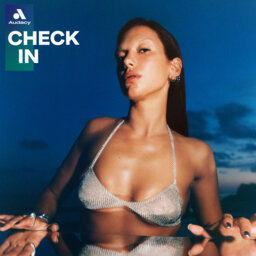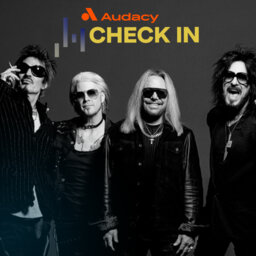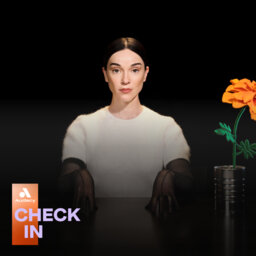Usher | Audacy Check In | 4.23.24
To celebrate all things Usher, the icon himself stopped by Audacy Atlanta’s V-103 studios to check in with Greg Street. The duo discussed everything from his early ATL days, his majorly successful Las Vegas Residency, his new album Coming Home, and everything in between.
After the longtime associates chopped it up and reminisced about Porsches and car shows, Usher went on to praise his mother for raising him to not only be creative, but also business savvy and entrepreneurial.
After acting as his manager for many years in a male dominated industry that’s also “not necessarily welcoming to parents,” Usher admitted he picked up a few things. “She managed to learn the business and then be successful in the business. Then we launched an amazing career that, gave album after album, after album, and then eventually, [we were] able to just celebrate that look back over the years and realize that this was all a dream,” the “Confessions” singer expressed.
“She inspired me to become the entrepreneur that I am today. After having been with record companies and being within this system for so many years now, coming back as an independent with my label Mega, and now I’m going back to the person who I started it with, which is L.A. Reid… We kicked it off here in Atlanta. Now here we are once again, after all that time we're back home.”
Obviously a major figure in Usher’s journey, his mother wasn’t the only one to help shape Usher into the icon he is today. Taking a trip down memory lane, and dropping some names along the way, Usher looked back at all the amazing people he’s worked with that helped him become the artist he is now.
“I’ve worked with incredible people,” Usher acknowledged, “including Jermaine Dupri, who helped me really find my voice, Jimmy Jam and Terry Lewis who helped me find my pen. Also working with incredible musicians like Emmanuel Seal and Bryan-Michael Cox, Johntá Austin.” Gaining “incredible inspiration from people who were the pioneers in this city like Rico Wade,” Usher added, going on to note, “Not many people know this side. I don't even know if you know this Greg, but I'm an honorary member of the Dungeon Family. I was there in the early days down in the dungeon, before OutKast was OutKast when it was Sleepy Brown and Marques.”
After delving into his origin story, which he began with meeting, AJ Alexander, who introduced him to Bryant Reid, “who discovered me at the talent search at EarthLink Live,” Usher got into how things began to really pop off once he met Jermaine Dupri.
“Well, I think I had had enough of people attempting to try and make me an artist. It was JD who really took the time to listen… At that point of my life, I was working with these producers, Tim and Bob, and I was working with JD. So I would either be in there with, you know, Phil Tan and Emmanuel Seal, and we'd just be working through things. But it was JD who was really listening,” Usher confessed. “It would be in those conversations that we had in passing, they'd begin to help me craft what my story was and find something that was authentic, that would give me a brand of my own. It didn't feel like I was just kind of putting on a suit that was tailor made for me, but didn't necessarily work for me.”
“This was my tailor made suit. This is when I actually established what Usher was, and it was authentic, it was from the South," he continued. “Even though I came by way of Chattanooga, Tennessee, Atlanta gave me an identity. It gave me something that I was proud of. It gave me something that I felt like I could represent. It gave me something of a style. It gave me something that was our own, you know what I mean? In the way we dress, in the way we sang, in the way we were able to articulate Hip-Hop and R&B in a way that wasn't like everybody else.”
While originally from Chattanooga, Tennessee, for Usher it’s very clear, “I represent Atlanta.” Declaring, “when I tilt that A hat to the right, it's because I found something here that was significant for me. I figured out what I wanted to do in Chattanooga, Tennessee, and then I found the reality of what that passion was in Atlanta… I figured out how to do it and who to do it with… that would then create hit records and we continued to keep that legacy.”
Noting that “even though we had moved out of Atlanta and made our way up to New York with Arista Records, it was still that homegrown idea of how we would create these melting pots of artists and artistry to create a body of work that was an album.”
“My Way was clear because it was really me and Jermaine Dupri's vision,” Usher began. “8701 became a little bit more of a collective working with Darryl Jones, Mark Pitts and Kawan “KP” Prather. We began to just try and build a more expansive idea of what Atlanta was, even though it was a worldwide recognized album. Was it an R&B album or was it an album that was popular because people gravitated toward it? It became something that the entire world would begin to understand. It wasn't until Confessions that I was able to tie it all together, where people understood — this is a story that's relevant. It's a story that's cultural, is my own, it's a story that creates legacy for me.”
“Now, I'm celebrating the 20th anniversary of that album here in Atlanta,” Usher exclaimed, noting “I broke these songs with Greg… So here now, coming home, having that real-world experience that took me all around the world, that's what that Coming Home name means. It is being able to come back now after having that world of experience and now be that guy.”
Discussing what it was like working on this new album, and it’s “collaborative process,” Usher continued to name drop, listing off some familiar names, and a few new ones as well.
“Working with L.A. … Keith Thomas… Jermaine Dupri… Bryan Michael Cox… Johntá Austin… even new producers. Pheelz was an artist and also producer that I wanted to work with,” whom he teamed up with for "Ruin." "And also being able to bring some of that ATL evolution out with Dream.”
“All of these songs, this music, is a melting pot of an experience. One — is some things that I lived out, but also an experience that feels very where I am. When I hear songs like ‘I Love U,’ songs like ‘I Am The Party,’ songs like ‘Bop,’ that's a culture that if you in Atlanta and you at Cascade, you know what bopping is.”
Going on to note that he’s the “luckiest man in the world,” for “being able to express love in a way that is a celebration,” Usher paused to mention he got married over Super Bowl weekend, ahead of his Halftime performance (as if we didn’t already know). “That is all within the story. Working with the producers that I chose to on this album and being able to collaborate it's always been a collaborative experience. It's never just been one way of doing what I do. Working with some of the people that I've worked with my entire life… and trying new ideas based [on] where I am in my life. It’s been an incredible year, man — two years.”
A major part of the last “incredible” two years includes Usher’s Vegas Residency, which according to him was on his mind, but not something he was really interested in doing quite yet, until Beyoncé inspired him otherwise.
“The idea of residency in itself had kind of been condensed to just parties. And while it's great to be able to go out there and celebrate, no hate… I was advocating for an underserved dynamic and audience. The dollar that was in Las Vegas was coming from all over the place. Some people from London… Australia, but not as many Black people. The black dollar wasn't as strong and relevant until I started doing these levels of residency. And while I ain't trying to pat myself on the back, it was a real deliberate decision that was really put on my mind many, many years ago.”
Revealing, “My mother told me, ‘Yo, we need to go to Las Vegas after Confessions.’ And I was like, ‘I'm not quite ready to do it right now. I just don't think that playing in Las Vegas would represent who and what I am right now. It may be perceived as, ‘Oh, this is the finale.’ I wanted to go do more, so I traveled the entire world.”
“Then Beyoncé played the Wynn in Las Vegas, and when I saw her show that she put together, then this light bulb went off. I was like, ‘You know what? When I'm ready to play Las Vegas, I want an experience.’” Unfortunately Usher’s realization came to him at a rather inopportune time, “when the entire world had stopped.”
“We were all locked away… we weren't gathering for concerts… all of these incredible venues were just empty. No basketball games, no nothing." Giving Usher “a grand opportunity to do two things. One, show how powerful the Black dollar is for this level of performance. When I look out in that audience every night, and I see a mixture of people, but the majority of it bring minorities, Black people who chose to get on a plane, take care of themselves, doll up, look beautiful for the night, put it on, and come out here and treat themselves. That was the purpose in point. I didn't want to be, an after-party. I wanted to be the party, I am the party. So I was like, this is what we're gonna do, we’re gonna go to Las Vegas and we're gonna elevate.”
Eventually a plan was made and the show came together. And then just days before opening night, the ish hit the fan. Calling it “the craziest s*** you could ever experience in your life," Usher went on to detail how, “48 hours before we actually opened the curtains, my entire cast sat down.” Explaining how some sat down due to health standards, masks, vaccines, etc. While understanding to those who felt this way, Usher still had a show to put on.
“Thank God I had invested in something that was different, which was an experience because, underneath my stage, there was an immersive experience that I wanted people to feel. So I took that entire immersive staff and we re-choreographed the entire show within 48 hours. I brought in three of my snipers, [that] I danced and performed with across the United States and even the world. We picked out a lot of choreography that we worked on before, and we managed to put together a show.” And “no one would ever know any of this,” in fact, “it was probably the best show that we'd ever put on.” We’ll leave it to Usher to tell you why.
“That was the opening,” he went on to add, “Now we eventually got it together and continued to craft some of what we found in that moment. It was something you would never experience in your life. It was the hardest thing I think I ever had to experience.”
Usher also discussed getting the Super Bowl halftime spot while running his residency, calling it “the craziest decision I ever had to make.” As well as his decision to launch his independent label with L.A. Reid. And that’s not even the half of it folks, for the entire in-depth conversation, press play on the interview above.
Words by Maia Kedem Interview by Greg Street
 Audacy Check-In
Audacy Check-In


